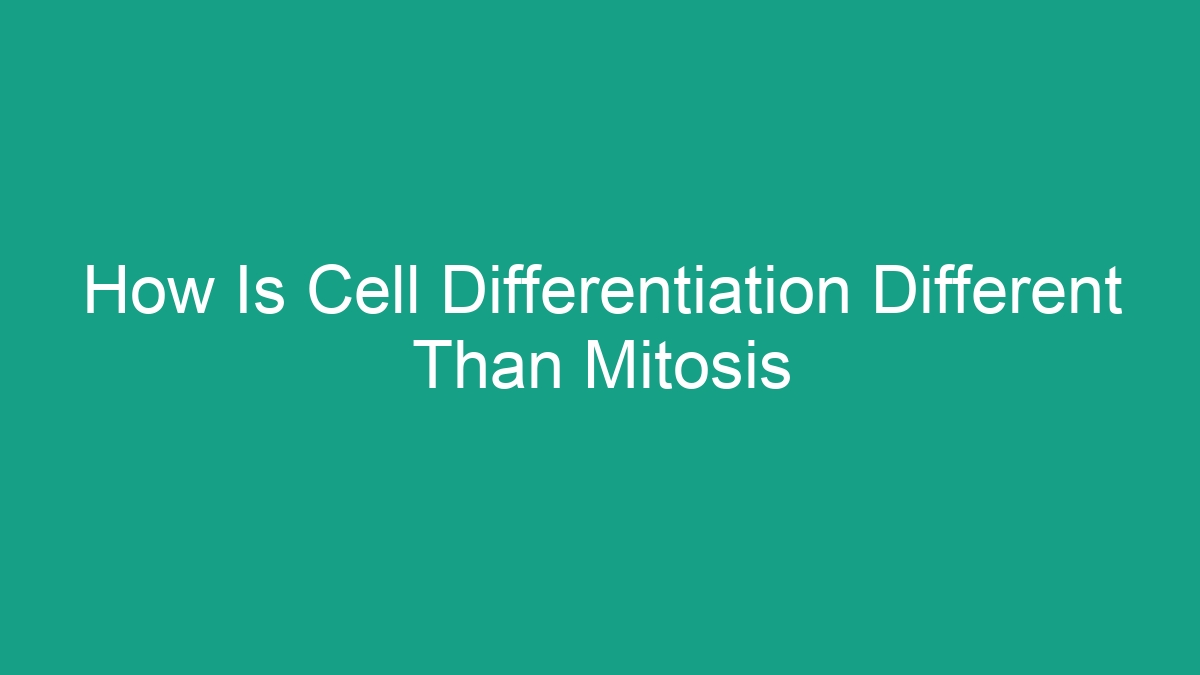
Introduction
Cell differentiation and mitosis are two fundamental processes in the life of a cell. While they are both essential for the growth and development of an organism, they serve different purposes and occur at different stages of the cell’s life cycle. In this article, we will explore the differences between cell differentiation and mitosis, their significance, and how they contribute to the overall function of living organisms.
Cell Differentiation
Cell differentiation is the process by which cells become specialized for specific functions in a multicellular organism. In simpler terms, it is the transformation of a cell from a generic state to a specialized state. This specialization allows cells to perform specific tasks that are essential for the overall function of an organism.
Here are some key points to understand about cell differentiation:
- Mechanism: Cell differentiation occurs through the activation and repression of specific genes within a cell’s DNA. This process is tightly regulated and influenced by various factors, including chemical signals from neighboring cells and the environment.
- Result: The end result of cell differentiation is the creation of a variety of cell types with distinct structures and functions, such as neurons, muscle cells, and skin cells. These specialized cells work together to form tissues, organs, and organ systems in the body.
- Importance: Cell differentiation is crucial for the development and maintenance of multicellular organisms. Without this process, the body would not be able to function properly, as each cell type has specific roles that contribute to overall health and survival.
Mitosis
Mitosis, on the other hand, is the process of cell division that results in the production of two daughter cells with identical genetic material to the parent cell. This is a key mechanism for growth, repair, and asexual reproduction in living organisms.
Here are some key points to understand about mitosis:
- Phases: Mitosis is comprised of several distinct phases, including prophase, metaphase, anaphase, and telophase. Each phase is characterized by specific events that ultimately lead to the separation of the genetic material and the formation of two daughter cells.
- Role: The primary role of mitosis is to ensure that each daughter cell receives an identical set of chromosomes, allowing for the growth and repair of tissues in multicellular organisms. It is also the process by which single-celled organisms reproduce asexually.
- Regulation: Mitosis is tightly regulated to prevent errors in chromosome segregation, which can lead to genetic abnormalities and diseases such as cancer.
Differences Between Cell Differentiation and Mitosis
While both cell differentiation and mitosis are essential processes in the life of a cell, they differ in several key ways:
- Purpose: Cell differentiation is primarily concerned with the specialization of cells for specific functions, while mitosis is focused on the replication and division of cells to generate new cells for growth and repair.
- Timing: Cell differentiation typically occurs during the early stages of development and continues throughout an organism’s life, while mitosis occurs as needed for growth, repair, and reproduction.
- Outcome: Cell differentiation results in the production of specialized cell types, whereas mitosis results in the production of identical daughter cells with the same genetic material as the parent cell.
Significance of Cell Differentiation and Mitosis
Both cell differentiation and mitosis play critical roles in the function and development of living organisms. Here are some of their key contributions:
- Cell Differentiation: Allows for the formation of diverse cell types that are essential for the structure and function of tissues, organs, and organ systems in the body. This specialization is crucial for the proper functioning of the organism as a whole.
- Mitosis: Enables growth and repair by producing new cells with identical genetic material to replace damaged or worn-out cells. It is also a key process in asexual reproduction, allowing single-celled organisms to reproduce and multiply.
FAQs
What is the main difference between cell differentiation and mitosis?
The main difference lies in their purpose and outcome. Cell differentiation is focused on the specialization of cells, resulting in a variety of cell types with distinct functions. Mitosis, on the other hand, is concerned with the replication and division of cells, producing identical daughter cells for growth, repair, and reproduction.
How does cell differentiation contribute to the overall function of living organisms?
Cell differentiation leads to the formation of specialized cell types that work together to form tissues, organs, and organ systems in the body. This diversity of cell types is essential for the proper functioning of the organism as a whole, allowing for complex physiological processes and tasks to be carried out efficiently.
Why is mitosis important for multicellular organisms?
Mitosis is crucial for the growth and repair of tissues in multicellular organisms. It produces new cells with identical genetic material to replace damaged or worn-out cells, allowing for the maintenance and regeneration of tissues throughout the organism’s life.
How are cell differentiation and mitosis regulated?
Both processes are tightly regulated to ensure their proper execution and prevent errors or abnormalities. Cell differentiation is influenced by various factors, including chemical signals from neighboring cells and the environment. Mitosis is regulated by checkpoints and specific proteins that control the progression of the cell cycle and chromosome segregation.



